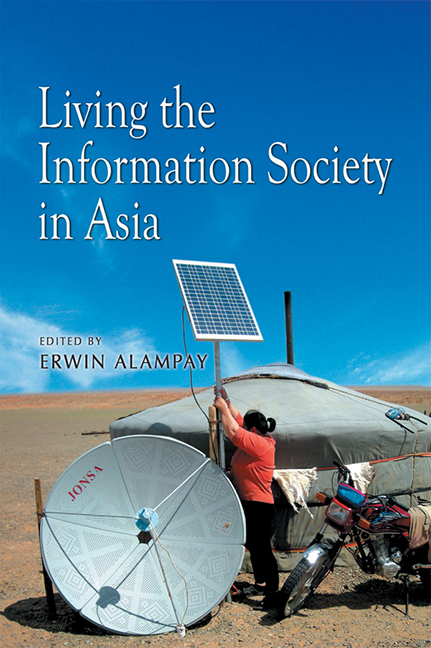Book contents
- Frontmatter
- Contents
- Foreword
- Preface
- List of Abbreviations
- Contributors
- Introduction: Perspectives of ICT Research in Asia
- 1 What Would Durkheim Have Thought? Living in (and with) the Information Society
- 2 What Is a Mobile Phone Relationship?
- 3 Technologies of Transformation: The End of the Social or the Birth of the Cyber Network?
- 4 Becoming Mobile in Contemporary Urban China: How Increasing ICT Usage Is Reformulating the Spatial Dimension of Sociability
- 5 Mobile Religiosity in Indonesia: Mobilized Islam, Islamized Mobility and the Potential of Islamic Techno Nationalism
- 6 Moral Panics and Mobile Phones: The Cultural Politics of New Media Modernity in India
- 7 Stories from e-Bario
- 8 Life and Death in the Chinese Informational City: The Challenges of Working-Class ICTs and the Information Have-less
- 9 Institutional Responses to GIS Adoption for RPTA in Local Governments
- 10 Customer Acquisition among Small and Informal Businesses in Urban India: Comparing Face-to-Face and Mediated Channels
- 11 The View from the Other Side: The Impact of Business Process Outsourcing on the Well-being and Identity of Filipino Call Centre Workers
- 12 Empowering Thai Homeworkers through ICTs
- Index
2 - What Is a Mobile Phone Relationship?
Published online by Cambridge University Press: 21 October 2015
- Frontmatter
- Contents
- Foreword
- Preface
- List of Abbreviations
- Contributors
- Introduction: Perspectives of ICT Research in Asia
- 1 What Would Durkheim Have Thought? Living in (and with) the Information Society
- 2 What Is a Mobile Phone Relationship?
- 3 Technologies of Transformation: The End of the Social or the Birth of the Cyber Network?
- 4 Becoming Mobile in Contemporary Urban China: How Increasing ICT Usage Is Reformulating the Spatial Dimension of Sociability
- 5 Mobile Religiosity in Indonesia: Mobilized Islam, Islamized Mobility and the Potential of Islamic Techno Nationalism
- 6 Moral Panics and Mobile Phones: The Cultural Politics of New Media Modernity in India
- 7 Stories from e-Bario
- 8 Life and Death in the Chinese Informational City: The Challenges of Working-Class ICTs and the Information Have-less
- 9 Institutional Responses to GIS Adoption for RPTA in Local Governments
- 10 Customer Acquisition among Small and Informal Businesses in Urban India: Comparing Face-to-Face and Mediated Channels
- 11 The View from the Other Side: The Impact of Business Process Outsourcing on the Well-being and Identity of Filipino Call Centre Workers
- 12 Empowering Thai Homeworkers through ICTs
- Index
Summary
INTRODUCTION
A relationship that uses a mobile phone is not necessarily a mobile phone relationship. For example, a brother and sister living in London may develop a multifaceted relationship over fourteen years using many different media, and adopt mobile phones when they become cheap enough. This results in some minor changes, such as the micro-management of meetings in town, but these are generally insignificant when taken in the context of the relationship as a whole.
By contrast let's imagine a relationship in the Philippines (taken from the book TXT-ING Selves, Pertierra et al. 2002 and more recent literature that follows similar lines of enquiry, e.g. Ellwood-Clayton 2005, 2006; Pertierra 2005; Ramon 2006; Solis 2006). I can imagine a young woman just getting into the joys of texting. She likes the particular way it lends itself to short, ambiguous and suggestive as well as creative communication. At this stage she starts a texting relationship with a man she happened to meet when he overlooked her writing a text on a crowded bus. To be honest she had no real interest at all in the man at first. She simply wanted an excuse to practise and develop this new medium of texting. But one of the treats of texting was flirting, and after a while she began to enjoy his facility with flirtatious texts, and realised this was a man she had quite a bit in common with. They did meet from time to time, there was even a brief sexual relationship between them, but that didn't work out so well, and soon they resumed what basically brought them and kept them together, the joys of text.
My third example comes from my fieldwork in Jamaica (Horst and Miller 2006). A staunch Pentecostal woman loves bringing the word of Jesus to all and sundry. She also enjoys what Jamaicans call counselling based on her conviction that she is inspired from above. A chance miscall introduces her to a teenager, whose hesitant phone manner betrayed a fragility she seizes upon to initiate a long conversation about this teenager's problems including her child's father who had betrayed her. This depth of confession and counselling might have been difficult if they had met face to face. But the anonymity and chance of this initial encounter led to a sustained exchange, even though the cost of the calls had an impact on both their budgets.
- Type
- Chapter
- Information
- Living the Information Society in Asia , pp. 24 - 35Publisher: ISEAS–Yusof Ishak InstitutePrint publication year: 2009

